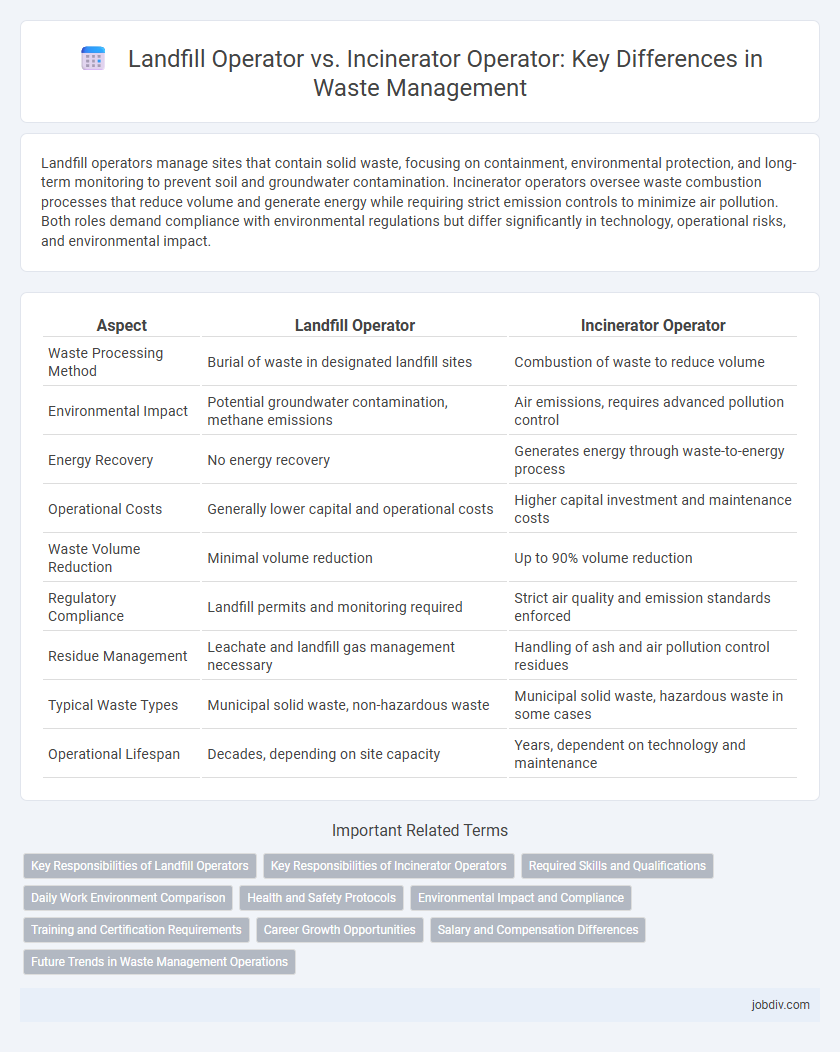Landfill operators manage sites that contain solid waste, focusing on containment, environmental protection, and long-term monitoring to prevent soil and groundwater contamination. Incinerator operators oversee waste combustion processes that reduce volume and generate energy while requiring strict emission controls to minimize air pollution. Both roles demand compliance with environmental regulations but differ significantly in technology, operational risks, and environmental impact.
Table of Comparison
| Aspect | Landfill Operator | Incinerator Operator |
|---|---|---|
| Waste Processing Method | Burial of waste in designated landfill sites | Combustion of waste to reduce volume |
| Environmental Impact | Potential groundwater contamination, methane emissions | Air emissions, requires advanced pollution control |
| Energy Recovery | No energy recovery | Generates energy through waste-to-energy process |
| Operational Costs | Generally lower capital and operational costs | Higher capital investment and maintenance costs |
| Waste Volume Reduction | Minimal volume reduction | Up to 90% volume reduction |
| Regulatory Compliance | Landfill permits and monitoring required | Strict air quality and emission standards enforced |
| Residue Management | Leachate and landfill gas management necessary | Handling of ash and air pollution control residues |
| Typical Waste Types | Municipal solid waste, non-hazardous waste | Municipal solid waste, hazardous waste in some cases |
| Operational Lifespan | Decades, depending on site capacity | Years, dependent on technology and maintenance |
Key Responsibilities of Landfill Operators
Landfill operators manage waste disposal sites by overseeing the proper burial and compaction of solid waste, ensuring environmental compliance with regulations such as the Resource Conservation and Recovery Act (RCRA). They monitor landfill gas emissions, leachate collection systems, and groundwater to prevent contamination and minimize ecological impact. Maintenance of landfill equipment and accurate record-keeping of waste types and volumes are also critical responsibilities to sustain safe and efficient landfill operations.
Key Responsibilities of Incinerator Operators
Incinerator operators are responsible for managing the combustion process to ensure efficient and safe waste disposal, maintaining temperature controls, and monitoring emissions to comply with environmental regulations. They regularly inspect and maintain incinerator equipment to prevent malfunctions and ensure operational stability. Additionally, they document operational data and report any anomalies to facilitate regulatory compliance and optimize waste-to-energy conversion.
Required Skills and Qualifications
Landfill operators require knowledge of environmental regulations, soil mechanics, and waste management systems, alongside skills in equipment operation and site monitoring. Incinerator operators need expertise in combustion processes, air pollution control, and machinery maintenance, coupled with strong analytical skills for emission testing and system troubleshooting. Both roles demand certifications in safety and environmental compliance, but incinerator operators typically require more technical training related to thermal systems and hazard management.
Daily Work Environment Comparison
Landfill operators manage extensive outdoor sites involving waste sorting, heavy machinery operation, and environmental monitoring, often facing exposure to weather and odor challenges. Incinerator operators work in controlled indoor facilities overseeing combustion processes, machinery maintenance, and emission control systems, requiring strict adherence to safety and air quality regulations. Both roles demand technical expertise but differ significantly in physical environment and operational risks.
Health and Safety Protocols
Landfill operators implement strict health and safety protocols focusing on controlling exposure to methane gas, leachate, and heavy machinery to prevent respiratory issues and accidents. Incinerator operators prioritize managing emissions of dioxins, particulate matter, and toxic gases, using advanced filtration systems and continuous air monitoring to protect worker health. Both roles require rigorous training in hazardous material handling, emergency response, and use of personal protective equipment to minimize occupational risks.
Environmental Impact and Compliance
Landfill operators manage waste by burying it, which can lead to soil and groundwater contamination if not properly regulated, requiring strict adherence to environmental compliance standards such as leachate treatment and methane capture. Incinerator operators reduce waste volume through combustion, which minimizes landfill use but necessitates advanced air pollution controls to limit emissions of dioxins, furans, and particulate matter, ensuring compliance with air quality regulations like the Clean Air Act. Both roles demand rigorous monitoring and reporting to meet environmental protection laws and mitigate their respective ecological impacts.
Training and Certification Requirements
Landfill operators typically require training in waste management, environmental regulations, and safety protocols, often needing certification through programs such as the Solid Waste Association of North America (SWANA). Incinerator operators must complete specialized training in combustion technology, emissions control, and hazardous waste handling, with certifications like the Certified Hazardous Waste Manager (CHWM) being common. Both roles demand ongoing education to comply with evolving environmental standards and operational safety requirements.
Career Growth Opportunities
Landfill operators typically experience steady career growth through roles in site management, environmental compliance, and regulatory oversight, often benefiting from certifications related to waste management and safety. Incinerator operators, with specialized training in combustion technology and emissions control, have opportunities to advance into technical supervisor positions or environmental engineering roles focused on reducing air pollution. Both career paths demand continuous professional development, but incinerator operators generally have faster growth due to the evolving technology and stricter environmental regulations.
Salary and Compensation Differences
Landfill operators typically earn an average annual salary ranging from $35,000 to $55,000, reflecting the physical and environmental monitoring aspects of the role. Incinerator operators tend to have higher compensation, with salaries usually between $45,000 and $70,000, due to the technical expertise required for combustion processes and emissions control. Benefits and overtime opportunities often enhance total earnings in both positions, but incinerator operators generally receive greater hazard pay and certification bonuses.
Future Trends in Waste Management Operations
Landfill operators are increasingly adopting advanced methane capture technologies to reduce greenhouse gas emissions, aligning with stricter environmental regulations and carbon neutrality goals. Incinerator operators are shifting towards energy recovery systems with higher efficiency and lower pollutant emissions, driven by innovations in waste-to-energy (WtE) processes and circular economy policies. Future waste management operations emphasize integration of AI-driven monitoring for real-time emissions control and resource optimization across both landfill and incineration facilities.
Landfill Operator vs Incinerator Operator Infographic

 jobdiv.com
jobdiv.com